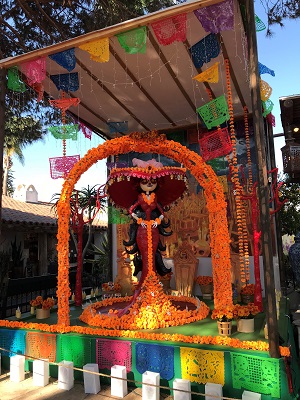About 3,000 years ago, Indigenous Peoples in central Mexico began celebrating and honoring life for three days, starting on October 31 and ending on November 2. Today, this celebration is known as Dia de Los Muertos.
On the first day, families begin preparing for the heavenly gates to open for the deceased souls to cross over and join the living at midnight. On the second day, families specifically celebrate deceased children and all religious Saints, and on the third day, they honor their beloved ancestors. During this time, families clean tombstones and decorate altars within homes with their loved ones’ favorite foods, belongings, and symbolic items that they would enjoy.
With about 56.5 million Hispanics living in the United State of America, it’s no surprise Hispanic culture and traditions are starting to integrate into U.S. society. Businesses are beginning to acknowledge these changes by implementing holiday hours and creating holiday-themed products for consumers. However, these products can overshadow the holiday’s origin or insult the culture. Not only do we start to see those who celebrate it become upset, but we can sometimes start to feel as though businesses take the true meaning out of the holiday. So how can businesses tread lightly on meaningful holidays and keep their company away from culture appropriation? Here are some tips for businesses to follow before placing a new product on the shelves:
- Try incorporating package inserts into Dia de Los Muertos products. This can act both a thank you card and an opportunity to inform buyers about the holiday
- Work with Latin artists who celebrate the holiday and support their creativity when creating new products
- Larger businesses can try to give back to underprivileged communities who celebrate these practices by becoming involved with community engagement
- For consumers: try attending a Dia de Los Muertos community festival and embrace learning about a new culture
This past June, then-United Nations Special Rapporteur on the Rights of Indigenous Peoples James Anaya was one of the three individuals to start the conversation of cultural appropriation within businesses (found in Article 43). Overall, the speakers argued that this issue is impacting Indigenous Peoples worldwide. In order to bring light to the matter, they said it’s best to create trademark-like protections for traditional cultural expressions or sacred items. Anaya stressed this is a social issue rather than a technical issue, and would help steer away from misappropriations on societies.
It’s important to recognize that the holiday originated in central Mexico. Unfortunately, these places struggle with poverty today. In fact, some families have to save up for months to afford ofrendas and offerings for their loved ones. If your business is partaking in Dia de Los Muertos this year, consider using the suggestions above to give back to these communities to create a bridge between consumers, holidays, and products.
Sharon Schweitzer and Esther Sanchez co-wrote this post. Sharon Schweitzer, J.D., is an award-winning entrepreneur, cross-cultural trainer, and the founder of Access to Culture. In addition to her accreditation in intercultural management from the HOFSTEDE Centre, she serves as a Chinese Ceremonial Dining Etiquette Specialist in the documentary series Confucius was a Foodie, on Nat Geo People. She is regularly quoted by BBC Capital, Investor’s Business Daily, and Fortune. Her Amazon #1 Best Selling book in International Business, Access to Asia: Your Multicultural Business Guide, (3rd printing), was named to Kirkus Reviews’ Best Books of 2015. She’s a winner of the British Airways International Trade Award at the 2016 Greater Austin Business Awards.
Esther Sanchez is a Fall 2017 Cross-Cultural Communication intern with Access to Culture. She is currently attending the University of Texas at Austin as a Journalism major and working to earn a minor in Middle Eastern Studies and a certificate in Computer Science. She plans to use these skills to tell stories through virtual reality from around the world. You can connect with her on LinkedIn or Facebook, Instagram or Twitter.
Photo Credit: Paola Guevara


Leave A Comment